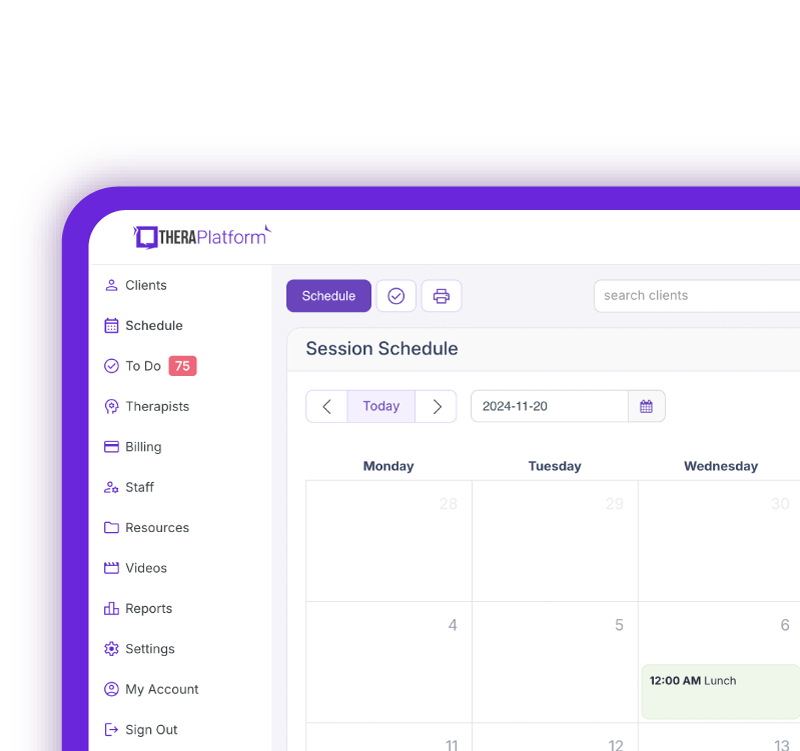CPT 97750

97750 CPT code is utilized for physical performance testing and measurement. It involves conducting standardized tests to assess a client's functional abilities, typically related to strength, endurance, range of motion, and other performance metrics.
Summary
- 97750 CPT code applies to standardized tests that measure a client's strength, endurance, range of motion, and overall physical performance in 15-minute increments. It helps guide treatment planning and rehabilitation progress.
- Therapists use CPT 97750 for Functional Capacity Evaluations (FCEs) to assess readiness for return to work, job site analysis to determine physical job demands, and post-injury recovery assessments.
- Therapists must document specific tests performed, quantitative and qualitative data, and clinical interpretations that connect findings to therapy goals. Demonstrating medical necessity ensures proper billing and avoids claim denials.
- Utilizing CPT 97750 effectively allows therapists to provide objective, data-driven care, advocate for workplace accommodations, and support insurance reimbursement for continued therapy interventions. Enrolling in an insurance billing course for therapists can help providers enhance their knowledge.
- Leveraging an EHR like TheraPlatform for efficient documentation and claim submission, therapists can improve compliance with HIPAA and payer guidelines, ensure timely reimbursement, and enhance overall billing accuracy for telehealth services.
→ Click here to enroll in our free on-demand Insurance Billing for Therapists video course [Enroll Now]
The 97750 CPT code represents a physical overall performance check conducted in 15-minute increments to assess a client’s musculoskeletal and purposeful potential. These checks are essential for clients in rehab or preparing to return to work after an illness or injury.
The overall purpose of CPT code 97750 is to evaluate a client’s functional capacity, measure physical performance to guide treatment planning, provide measurable objective data to track progress in therapy, determine workplace accommodation needs, and assess post-injury recovery.
Streamline your insurance billing with One EHR
- Claim batching
- Auto claims
- Automated EOB & ERA
- Real-time claim validation
- Real-time claim tracking
- Aging and other reports

When to use 97750 CPT code
CPT code 97750 applies to scenarios in various clinical settings where therapists conduct an in-depth analysis and assessment of a client’s physical performance. It is commonly utilized in functional capacity evaluations, job site analysis, and to evaluate client conditions.
By conducting comprehensive evaluations using CPT code 97750, therapists can develop targeted treatment plans, assist in work reintegration, and advocate the need for adaptive equipment or modifications that enhance a client’s functional independence in daily activities.
This also allows therapists to provide treatment interventions that are data-driven and specifically tailored to the needs of each client, leading to client-centered care, and overall improved rehabilitation outcomes.
Functional Capacity Evaluations (FCEs)
- Assesses the physical abilities of clients who have suffered a work-related injury
- The goal of FCEs is to determine the degree of a patient’s function or readiness for work after injury
- Guides return-to-work decisions and accommodations
- Provides data for legal and insurance claims
Job site analysis
- Evaluation of whether a client can meet the physical demands of employment.
- Helps prevent workplace injuries and ensures employees are physically capable of performing essential job-related tasks.
Client conditions
- Post-Injury recovery: Therapists will assess functional progress after an injury, illness, or surgery. Therapists will evaluate strength, endurance, range of motion, and pain levels.
- Work-related impairments: Evaluation of limitations due to musculoskeletal conditions, repetitive strain injuries, or workplace injuries.
- Ergonomic assessments: Assessment and identification of workplace modifications necessary to help prevent workplace injuries and improve the efficiency of work for those with physically demanding roles.
Watch this video to learn common insurance billing struggles and solutions
→ Start My Free Trial
→ Start My Free Trial
Key components of the 97750 CPT code
To ensure accurate billing, therapists must understand what is included in CPT code 97750. This CPT code is a time-based code and is billed in 15-minute increments. The number of units billed depends upon the time spent conducting the assessment.
Therapists should document the exact duration of the testing process to ensure proper reimbursement. CPT code 97750 includes an evaluation of strength, endurance, range of motion, functional tests related to job-related tasks, daily activities, pain analysis, movement patterns, standardized assessments to quantify performance, and safety considerations.
Documentation requirements for the 97750 CPT code
Comprehensive and detailed documentation is essential for successful reimbursement and accurate billing. When billing for CPT code 97750, therapists must include a comprehensive evaluation that outlines the specific tests performed, such as assessments of strength, balance, cardiovascular endurance, and pain levels.
According to the Centers for Medicare and Medicaid, "testing and/or measurement results with comparative values for specific standardized grading scales" should be included in the documentation.
Therapists should document results such as qualitative and quantitative data. Clinical interpretation that connects findings to therapy goals with a thorough explanation is essential. It is crucial to establish the functional relevance of the assessment by explaining how the client’s performance impacts their daily activities and overall function.
Furthermore, therapists should demonstrate medical necessity by detailing how the results will influence treatment planning and intervention strategies, ensuring a clear link between the evaluation and the therapeutic goals.
By maintaining detailed records, occupational therapists can justify their services for insurance providers and support the need for continued therapy interventions.
Billing and reimbursement using the 97750 CPT code
To maximize reimbursement and ensure proper and efficient claim submissions, therapists should properly utilize CPT code 97750. This can be done by documenting the complexity and necessity of the performance tests and using objective data to justify why the assessment was needed.
Therapists should also avoid using the code for routine therapy sessions or progress notes without a structured performance evaluation. Additionally, therapists should be aware of payer policies and insurance verification, as coverage for CPT code 97750 varies across insurance providers, with some payers requiring prior authorization for functional capacity evaluations. It is also vital to check the client’s insurance plan for limitations on billing frequency and documentation requirements to ensure efficient reimbursement and avoid claim denials.
The 97750 CPT code is an essential code for evaluating physical performance in occupational therapy. It provides objective data that allows for treatment planning, supports therapy goals, and ensures clients receive appropriate interventions.
By following best practices in documentation and adhering to payer policies, occupational therapists can maximize reimbursement while delivering high-quality care. As occupational therapists, leveraging CPT code 97750 allows for precise assessment and data-driven decision-making that enhances physical performance and client outcomes.
By staying informed and diligent in documentation, therapists can ensure compliance and optimize functional recovery for their clients. Utilizing this code effectively not only helps therapists advocate for their client’s needs but also reinforces the value of occupational therapy in functional rehabilitation.
Additionally, by continuously refining assessment techniques and maintaining thorough documentation, therapists can contribute to the advancement of evidence-based practice, ensuring the best possible care and outcomes for their clients.
Practice Management + EHR + Telehealth
Mange more in less time in your practice with TheraPlatform

How EHR and practice management software can save you time with insurance billing for therapists
EHRs with integrated billing software and clearing houses, such as TheraPlatform, offer therapists significant advantages in creating an efficient insurance billing process. The key is minimizing the amount of time dedicated to developing, sending, and tracking medical claims through features such as automation and batching.
What are automation and batching?
- Automation refers to setting up software to perform tasks with limited human interaction.
- Batching or performing administrative tasks in blocks of time at once allows you to perform a task from a single entry point with less clicking.
Which billing and medical claim tasks can be automated and batched through billing software?
- Invoices: Create multiple invoices for multiple clients with a click or two of a button or set up auto-invoice creation, and the software will automatically create invoices for you at the preferred time. You can even have the system automatically send invoices to your clients.
- Credit card processing: Charge multiple clients with a click of a button or set up auto credit card billing, and the billing software will automatically charge the card (easier than swiping!)
- Email payment reminders: Never manually send another reminder email for payment again, or skip this altogether by enabling auto credit card charges.
- Automated claim creation and submission: Batch multiple claims with one button click or turn auto claim creation and submission on.
- Live claim validation: The system reviews each claim to catch any human errors before submission, saving you time and reducing rejected claims.
- Automated payment posting: Streamline posting procedures for paid medical claims with ERA. When insurance offers ERA, all their payments will post automatically on TheraPlatform's EHR.
- Tracking: Track payment and profits, including aging invoices, overdue invoices, transactions, billed services, service providers.
Utilizing billing software integrated with an EHR and practice management software can make storing and sharing billing and insurance easy and save providers time when it comes to insurance billing for therapists.
Streamline your practice with One EHR
- Scheduling
- Flexible notes
- Template library
- Billing & payments
- Insurance claims
- Client portal
- Telehealth
- E-fax

Resources
TheraPlatform is an all-in-one EHR, practice management, and teletherapy software built for therapists to help them save time on admin tasks. It offers a 30-day risk-free trial with no credit card required and supports different industries and sizes of practices, including occupational therapists in group and solo practices.
More resources
- Therapy resources and worksheets
- Therapy private practice courses
- Ultimate teletherapy ebook
- The Ultimate Insurance Billing Guide for Therapists
- The Ultimate Guide to Starting a Private Therapy Practice
- Mental health credentialing
- Insurance billing 101
- Practice management tools
- Behavioral Health tools
Free video classes
- Free on-demand insurance billing for therapist course
- Free mini video lessons to enhance your private practice
- 9 Admin tasks to automate in your private practice
References
Billing and coding: Therapy Evaluation, Re-evaluation and Formal Testing. https://CMS.gov
Centers for Medicare & Medicaid Services https://www.cms.gov/medicare-coverage-database/view/article.aspx?articleid=53309
Functional Capacity Evaluations. Johns Hopkins Medicine https://www.hopkinsmedicine.org/physical-medicine-rehabilitation/specialty-areas/physic al-therapy/functional-capacity-evaluations
Services, C. M. B. (2024, December 9). Physical Performance Testing Made Simple with 97750 CPT code. LinkedIn https://www.linkedin.com/pulse/physical-performance-testing-made-simple-hwkyc



